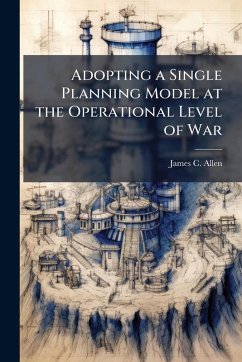
Does the Bundeswehr Learn From its Operational Experiences?
Versandkostenfrei!
Versandfertig in über 4 Wochen
14,99 €
inkl. MwSt.
Weitere Ausgaben:

PAYBACK Punkte
7 °P sammeln!
The way the Bundeswehr as an organization collects, analyzes and disseminates lessons learned from its operational experiences is not only of utmost significance for force protection and effectiveness in missions but also gives critical indications for how effectively the German Army learns as part of the Bundeswehr. This monograph analyzes the German lessons learned process on the basis of the two most relevant directives of the German Ministry of Defense and Standing Operating Procedures of the Bundeswehr Operations Command. These papers describe in detail purpose, responsibilities, coordina...
The way the Bundeswehr as an organization collects, analyzes and disseminates lessons learned from its operational experiences is not only of utmost significance for force protection and effectiveness in missions but also gives critical indications for how effectively the German Army learns as part of the Bundeswehr. This monograph analyzes the German lessons learned process on the basis of the two most relevant directives of the German Ministry of Defense and Standing Operating Procedures of the Bundeswehr Operations Command. These papers describe in detail purpose, responsibilities, coordination measures, workflow and organizational structure. The research here does not address the issue whether human behavior and leadership culture in the Bundeswehr contribute to its learning capability. That research does not lie within the scope of this study. The monograph introduces current approaches to organizational learning and identifies ten normative facilitating factors that promote learning. The more each facilitating factor is prevalent in an organizational unit the more opportunity exists for learning. The main discussion focuses on relevant elements that process lessons learned in the Bundeswehr in general and the Army in particular. The elements can be categorized in three groups: elements that acquire information, elements that interpret and disseminate information, and elements that ensure the application of lessons learned. These three categories and their interaction with each other are assessed by means of the identified facilitating factors. It appears that the German way to acquire, interpret, disseminate and ensure the application of lessons learned fulfills by and large the requirements of the identified facilitating factors. Accordingly, the lessons learned system is appropriate to provide the necessary and sufficient conditions that allow learning to emerge and flourish. However, the research also reveals barriers to learning that hamper effective orga This work has been selected by scholars as being culturally important, and is part of the knowledge base of civilization as we know it. This work was reproduced from the original artifact, and remains as true to the original work as possible. Therefore, you will see the original copyright references, library stamps (as most of these works have been housed in our most important libraries around the world), and other notations in the work. This work is in the public domain in the United States of America, and possibly other nations. Within the United States, you may freely copy and distribute this work, as no entity (individual or corporate) has a copyright on the body of the work. As a reproduction of a historical artifact, this work may contain missing or blurred pages, poor pictures, errant marks, etc. Scholars believe, and we concur, that this work is important enough to be preserved, reproduced, and made generally available to the public. We appreciate your support of the preservation process, and thank you for being an important part of keeping this knowledge alive and relevant.












